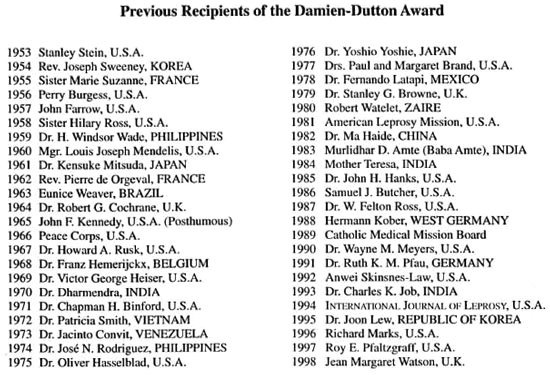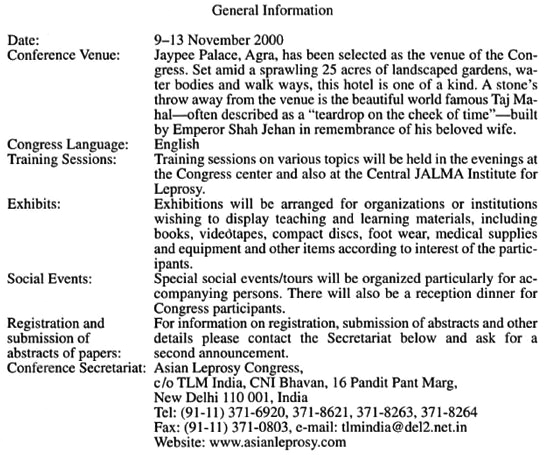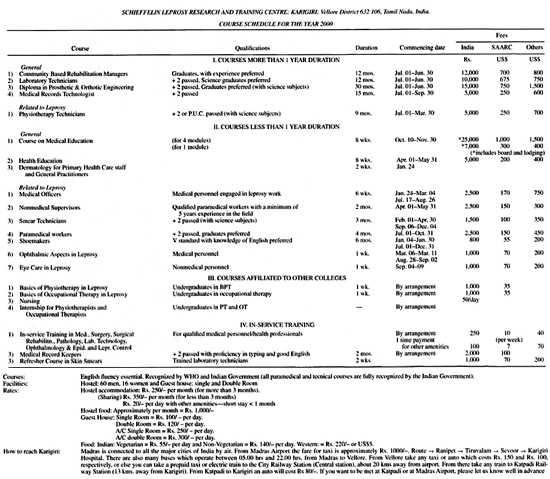- Volume 68 , Number 1
- Page: 76–83
News and notes
This department furnishes information concerning institutions, organizations, and individuals engaged in work on leprosy and other mycobacterial diseases, and makes note of scientific meetings and other matters of interest.
1999 DAMIEN-DUTTON AWARD

Medical Missionary of Mary Sister Margaret Anne Meyer (r), who operates a clinic in Nigeria which treats people with leprosy, receives the Daniien-Dutton Award tor 1999 from Howard Crouch, President and Founder of the Damien-Dutton Society, and Bishop John Dunne (I), vicar for the Diocese's Central Vicariate and a member of the Society's Advisory Board. (Photo courtesy of the Long Island Catholic)
Al their annual board meeting in Bellmore, New York, U.S.A., on 11 November, the Damien-Dutton Society bestowed its 1999 Award to Sister Doctor Margaret Anne Meyer of the Medical Missionaries of Mary. Sister Margaret Anne is a native of Queens, New York, who attended medical school in Dublin, Ireland, after taking her final vows with the Medical Missionaries of Mary. After graduation she went to Uganda in 1966 where she did general medicine for 12 years. Due to political unrest there, Sister Margaret Anne left Uganda and went to Tanzania where she saw leprosy and tuberculosis patients. Ten years later she was sent to Ogoja, Nigeria, where leprosy remains a problem, and where she has continued her ministry. Sister Margaret Anne said, "I feel I am accepting the award for all the other Sisters." The Medical Missionaries of Mary have been working among the leprosy patients in Ogoja since 1945.
May we all add our congratulations to Sister Margaret Anne and her order on this well-deserved recognition.

Argentina. Bergel book available. The Institute of Leprological Research has pub-lishcd a book (in English) of 214 pages byProf. Meny Bergel entitled: Metabolic Theoty of Leprosy. The book will bc sent free ofcharge upon request to: Prof. Meny Bergel,Institutc of Leprological Rescarch, Para-guay 1365-2, 1057 Buenos Aires, Argentina.
9th International Congress on infectious Diseases (ICID). The 9th ICID will be heldin Buenos Aires on 10-13 April 2000. Fordetails contact: 9th ICID Congress Secre-tariai, Congresos Internacionales SA,Moreno 584, piso 9, 1091 Buenos Aires, Argentina. Fax: 54-11-4331-0223, 54-11-4334-3811.
India. Asian Leprosy Congress to be held. The Asian Lcprosy Congress will be held 9-13 November 2000 ai the Jaypee Palace Hotel in Agra, India. The following is from the first announcement brochure.
Message from the Organizing Committee of the Congress
Dear Colleagues,
During the 15th International Leprosy Congress held in Beijing in the month of September 1998 there was a strong desire to hold regional congresses in between the quinquennial international congresses in order to promote more frequent interaction among participants and also to highlight regional issues, problems and achievements. This desire has culminated in the decision to hold the first Asian Leprosy Congress at Agra, India, under the banner of ILA from 9-13 November 2000.
It is only appropriate that the first regional Congress takes place in Asia in view of the tremendous problem of leprosy which the continent still is facing in spite of the enormous progress made in combating the disease over the past 10 to 15 years.
The Congress, apart from discussing technical and research issues, is expected to focus more on the problems of the common leprosy worker in combating the disease and in helping them to find solutions to such problems. This should also help in better interaction between researchers and developers of technical solutions on the one hand and the ultimate utilizers of such solutions on the other. In order to promote this approach the organizers of the Congress would like to encourage and facilitate participation of as many leprosy workers as possible, particularly those involved in leading and organizing the fight against leprosy in the field.
Even though the Congress is called Asian Leprosy Congress with focus on Asia, it is expected that the Congress would greatly benefit from experiences in other parts of the world and, therefore, would welcome participation from everywhere.
On behalf of the Organizing Committee, we extend our cordial invitation to all those interested in the fight against leprosy to participate in the Congress, so that together we can progress toward a world without leprosy which is our ultimate goal.
Dr. S. K. Noordeen
Chairperson
Organizing Committee
Dr. C. S. Walter
Secretary
Organizing Committee

BLP observes World Disabled Week. The Bombay Leprosy Project (BLP) commemorated World Disabled Week on Sunday, 5 December 1999.
The concept of leprosy control programs observing World Disabled Day (WDD) with as much enthusiasm as they show in celebrating World Leprosy Day (30 January) was generated by BLP in the year 1992 and propagated and practiced regularly since then. What was especially significant in BLP's commemorating WDD this year was that the venue of this function held on 4 December 1999 to commemorate the event was the heart of a Bombay slum where BLP's field research in Community Based Rehabilitation (CBR) is in progress.
The guest of honor was none other than an elderly disabled patient who distributed calipers and other aids and appliances to his fellow handicapped in the slum of Bharat Nagar, Bandra (East). It is to be noted that some of the victims of leprosy and other disabling diseases learn computer technology in this slum center. The beneficiaries of physical rehabilitation in this slum of 72,170 citizens amount to 172 of which 18 are leprosy disabled, all of whom were identified by volunteers of the same slum community.
Dr. R. Ganapati, BLP Director, remarked that if our experience about the challenging nature of the training and rehabilitation of all these handicapped in a single slum offers any indication, it is that the resources needed to do reasonable justice to solve the entire problem in this megacity with its sprawling slums would indeed be enormous.
Although the transmission of leprosy is reasonably contained, it is expected that the predicament related to disability of leprosy victims and their rehabilitation in an integrated manner with the general handicapped would prove to be quite a gigantic task.
Mr. A. P. Tripathi, physiotherapist, helped the patients to apply the aids and demonstrated their usage.
Dr. V. V. Pai, BLP Deputy Director, proposed the vote of thanks.-R. Ganapati
Schieffelin-Karigiri 2000 Course Schedule. We have received the 2000 course schedule for Karigiri shown on pages 82 and 83 from Dr. N. B. B. Reddy, Training Director.
21st Biennial Conference of IAL. The 21st Biennial Conference of the Indian Association of Leprologists (IAL) was held at the Postgraduate Institute of Medical Education and Research during 17 to 19 September 1999 under the warm hospitality of Prof. Bhushan Kumar, Department of Dermatology, STD and Leprosy. More than 300 delegates both from India and abroad actively participated in the three-day scientific deliberations of the Conference.
On the forenoon of 17 September there was a symposium which dealt with Continuing Priorities in Leprosy. The session started with discussion on Neuritis. The aim of taking this subject was to standardize five important aspects of neuritis. As homework, a group of experts under the chairmanship of N. B. B. Reddy, Karigiri, framed the definitions related to neuritis; the CLT&RI under the guidance of P. K. Oommcn identified the minimum information on structure and function of nerve; the Central JALMA Institute for Leprosy has worked on examination protocol with B. K. Girdhar as chair; Bombay Leprosy Project under the guidance of R. Ganapati prepared the recording and reporting system and R. S. Misra and his team finalized the management part. The proposed recommendations were briefly presented to the Conference under the chairmanship of G. Ramu and suggestions from the delegates were incorporated. This was followed by the presentation by Diana Lockwood, the lead speaker on the subject. In her presentation she emphasized the need for a robust testing method for detecting nerve involvement early, understanding the pathogenesis with reference to molecular/immunologic mechanisms, role of steroid and newer immunomodulating agents in management of neuritis. K. V. Desikan spoke on post-MDT monitoring and evaluation and emphasized the need for an inbuilt system of surveillance to detect relapse. He also briefly dealt with the importance of justifying the utility, safety, cost-effectiveness and advantages of FDT. Ebenezer Daniel stressed the need for incorporating comprehensive eye care in the program. Ben Naafs' talk dealt with all components of reaction in brief with particular reference to neuritis. Indira Nath's presentation emphasized the strong probability of dysregulation of IL-4 as a major factor in bringing the clinical changes in reactions. A. N. Chakraverti's presentation emphasized the homology of animal, human and soil derived CAN bacteria whose genetical heterogenicity may help in evaluating the time and place of the origin of the disease.
The post-lunch session had the CME under the banner "Newer Frontiers" in which N. S. Dharmashaktu highlighted the achievements of the NLEP in India and opined that probably the program is at its peak and ripe for integration. A. M. Dhople spoke on leprosy research beyond the year 2000 AD, while K. Prabhakaran dealt with treatment of patients relapsing after MDT G. P. Talwar stressed the role of combined chemotherapy and immunotherapy in leprosy elimination. Yasin Quabati from Yemen projected his country's and global achievements through MDT. M. D. Guptc presented the data of a comparative vaccine trial and pointed out the role of vaccines in the control of leprosy. S. K. Satpathy and B. L. Sharma presented the innovative approaches of involving community members undertaken by the DANLEP.
On the morning of 18 September, amid a bounty of glamor, the Conference was inaugurated by N. K. Ganguly, Director-General of the Indian Council of Medical Research. In the inaugural session two small books on leprosy were released and A. R. K. Pillai, Director, Indian Leprosy Foundation, was felicitated. After the inauguration the keynote address "A World Without Leprosγ-What It Should Mean" was delivered by Yo Yuasa, and S. K. Noordccn chaired the session.
Dr. Yuasa's lecture dealt with two important issues, namely, the elimination and history of leprosy. He started with the definition of control, elimination, eradication and extinction, the terms which were defined in a meeting organized at Atlanta by the WHO. The theme of the meeting was "Global Disease Elimination and Eradication as Public Health Strategies." This was attended by 400 experts from all over the world who dealt with the above four stages of medical intervention in control of a disease. Accordingly, the elimination is the zero incidence of a disease in some part of the world at a given time. Dr. Yuasa mentioned the inadequacies in resources and tools for elimination of leprosy in the technical sense and probably there is not much economic advantage to do so. Instead there should be emphasis for a better control of the disease in order to lessen and perhaps to eliminate as much as possible the medical and social problems of the disease. Dealing on the history of leprosy, he pointed out the need to learn from the past stories of human behavior toward the disease and its sufferers which, in a word, was a shameful one. There is need to change the behavior not only to people affected with leprosy but to anyone different in appearance and, indeed, any one we instinctively consider not belonging to us, for whatever reasons. Human beings are superior to the rest of the animals as they possess intellect. At the threshold of the 21st century, modern man must be a better master of his own behavior and see what is inside of an apparently different outside appearance. Although the physical condition of leprosy patients needs our medical care, the real person inside needs our fellowship as an equal partner in life.
The Conference received a total of 147 abstracts of which 59 were selected for free papers and the remaining 88 were posters. The sessions for free papers were on clinical leprosy, therapy of leprosy, immunology, experimental leprosy, microbiology and pathology, and social aspects and epidemiology. These sessions were chaired by V. H. Jadhav, V. K. Sharma, S. G. Dastidar, V. P. Shetty, K. V. Desikan, Mathura Prasad, C. S. Walter, V. V. Dongrc and Adarsh Chopra. There were also a couple of awards. The Acworth Research Society Award for the best free paper went to Anup De Sarkar of Chandigarh. The award for the best publication went to Gigi Ebenezer, Karigiri. Viswanath Prasad, Kiran Katoch and P. B. Ranganatha Rao, respectively, got the first, second and third prizes for posters.
The valedictory session was presided over by C. S. Walter, Director for The Leprosy Mission, South-East Asia. In this brief parting session the IAL felicitated The Leprosy Mission on its completion of 125 years of dedicated service. In addition the chairman thanked the organizing committee on behalf of the delegates and the organizing secretary thanked his team. Judged in terms of scientific content, floor management, the hospitality for the delegates, probably it was a superbly organized meeting. Prof. Bhushan Kumar and the team he led deserve high commendation.
The 1AL also had its general body meeting on 18 September and the following have been elected as the Central Council members for the coming term of 2 years. President: Dr. S. K. Noordccn, Vice Presidents: Dr. Bhushan Kumar and Dr. C. R. Rcvankar, Hon. Secretary: Dr. Sreevatsa and Treasurer: Dr. P. Vijayakumaran.-D. Porichha, Editor, Kusht Vinashak, New Delhi
Sweden. 10th European Congress of Clinical Microbiology and Infectious Diseases (ECCM/D) to be held 28-31 May 2000. Stockholm will be the site of the 10th ECCMID. For details contact: 10th EC-CMID 2000, Stockholm Convention Bureau, P.O. Box 6911, SE-102 39 Stockholm, Sweden. Tel: 46-8-736-1500; Fax: 46-8-348441, email: cccmid@stocon.se ; WWW:http://www.stocon,sc/eccmid
U.K. Forum on leprosy up and running. After many painful experiences, the Internet "Forum on Leprosy" is now up and running. There are various "categories'" where those who already are on-board and those thinking about joining, will be free to post articles. When posting articles, look for the "Send New Message" on the top browser bar and hit that button. Then "Choose a category" under which to file your message.
The categories embrace most of the various aspects of leprosγ-"Clinical Pathology," "Research," "Immunology," "Leprosy Organizations," "Reconstructive Surgery," "Rehabilitation/Occupational Therapy," "Immunology," "Rcactional States," "Diagnosis and Differential Diagnosis," "Bookshops on the Net where leprosy books are available," "Prevention of Disability," "Epidemiology," "Control," "Social and Psychological Aspects," "Chemotherapy/Drugs," "Treatment" etc. There is a department where everyone may feel free to contribute out of their expertise. If you would like to join, forward your details and e-mail address to: Keith Skillicorn, International Benevolent Services, "Roschaven," Unit 4, 953 North East Road, Modbury, South Australia 5092, Australia. Your e-mail address will be sent to "DELPHI" (the organization which provides this facility), who will e-mail you the Registration Form. It takes only minutes to fill in the details and e-mail it back to DELPHI. There is no charge.-Lepr. Rev. 70 (1999) 222
Joint meeting on new challenges in tropical medicine and parasitology will be held in September 2000. Oxford 2000: New Challenges in Tropical Medicine and Parasitology will be held 18-22 September 2000 in Oxford. This is a joint meeting of the British Society for Parasitology, the Royal Society for Tropical Medicine and Hygiene, and the American Society for Tropical Medicine and Hygiene. For details Contact: Complete Congress Services, 19 King Edward Street, Macclesfield, Chcchire SK10 1AQ, U.K. Tel: 44-0-1625624091; Fax: 44-0-1625-430544; email: ccs@cmc.co.uk ; WWW: http://www.umds.ac.uk/bsp/
LEPRA creates new fund in memory of Dick Rees. LEPRA staff, together with over a hundred others from the leprosy world, commemorated the death of Dr. Dick Rees with a memorial service at the National Institute for Medical Research in London in February 1999. Dr. Rees played such a central role in the leprosy field that LEPRA and its Executive Board have decided to honor his memory by instituting a fund which will allow us to support those working in leprosy to undertake useful training in the U.K. or elsewhere. In addition to the support already provided to Medical Elective Students from this country, the fund will enable one person each year to undertake a longer period of study aimed at strengthening their capacity to contribute to antileprosy work in their country. The new fund will be called the Dick Rees Memorial Fund.- Lepr. Rev. 70(1999) 231
